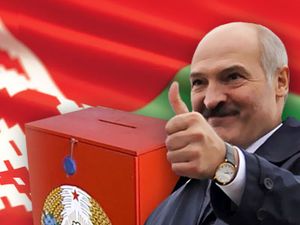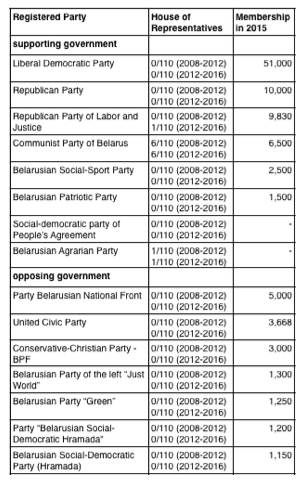A multiparty system in Belarus is a chance for the regime to demonstrate that it is not authoritaria

In reality, many of the parties supporting the government have maintained a nominal existence while the freedom to operate for opposition parties has been severely blocked, writes Tatsiana Kulakevich.
On 9 June, the Chairman of Central Election Commission, Lidzia Jarmoshyna, declared that the 2015 presidential election in Belarus would take place on 11 October, pushing it ahead of the previously declared 15 November date, the latest possible date permitted by law. The House of Representatives will likely make the final decision on the matter by June 30 before their summer recess.
However, for the outcome of elections the date does not really matter. Despite the official figure of around 98,000 members of political parties in Belarus in reality many of the parties supporting the government have only maintained a nominal existence while the freedom to operate for opposition forces has been severely constrained.
Parties as a representative force
The decision of Central Council of the Belarusian "Green" Party to support an unemployed Yury Shulgan exposes the farce of the election and the lack of influence of political parties within the Belarusian political system. Shulgan has expressed his willingness to become the President as a symbol of protest against the tax on the unemployed signed on 2 April by the incumbent president.
Political parties in Belarus are struggling to fulfil what would be considered their most basic principle functions, nor the activities of the state apparatus or supporting the implementation of the domestic and foreign policy of the state. While the Presidential Administration has proven to be much more powerful than the Parliament, both the parties, whether they oppose or support the government, have been denied a significant presence, if any presence at all, in the Parliament.
The Communist Party of Belarus gained six seats in the 110-seat House of Representatives in the previous elections, by far the most seats any registered party was able to obtain in the 2012 parliamentary elections.
As in Western democracies, the Belarusian Constitution identifies political parties as entities responsible for contributing to, and the expression of, the political will of its citizens. Lukashenka, however, has repeatedly declared that Belarusians are the source of his legitimacy. In reality, the people’s is not represented by any legislative authorities.
Party membership: by the numbers - on paper and in reality
Joining a political party presupposes that one wants to significantly influence the governance of their country. A modest membership base of Belarusian parties hardly justifies such claim. While the Ministry of Justice does not have the most current numbers on party membership, the total number of members of political parties, as reported by the parties, amounts to 98,000 people in a country with a population of about 9,5 million.

It is hard to determine the real number or the number of active members. As Yauhien Valoshyn of Euroradio suggests, after contacting the Liberal Democratic Party, claiming to have the largest membership base, two different party representatives reported 45,000 and 51,000 members respectively. The total number of members on the party web site, however, was determined to be around to 36,849 members.
The mass media, for its part, report that the leader of the Belarusian Patriotic Party Mikalai Ulahovich has forced Cossacks to join his party. Anatoly Liabedzka of the United Civil Party recognizes that the number of active members of his party adds up to less than the reported total of 3,668 members.
Unlike other countries, Belarusian parties do not provide social opportunities, personal status or business contacts. In addition, the majority of Belarusians do not believe that party membership will have an effect on whether or not a party will achieve its goals.
According to IISEPS, 59.8 per cent of respondents do not believe in the possibility of radical changes in domestic or foreign politics of Belarus, and 79.2 per cent will not participate in mass protests should election outcomes are falsified.
Party leaders
Most of the leadership of the political parties have been in the opposition for a decade and often much longer. One-third of the leaders of Belarusian political parties of all registered parties in Belarus have been ruling for the same amount of time or longer as the incumbent president.
The average time of opposition leaders in office now has been inflated to 13.6 years. In a research survey published on Arche portal, Yury Chavusau reports that the absence of opposition sub-parties in the majority of opposition parties. According to the author, no one is fighting for power within the parties because of the hardship and danger of the party leaders' work.
The existence of multiple potential presidential candidates does not increase the chances for success. According to Gene Sharp, a renowned political scientist advancing the study of nonviolent action, resistance leaders need to formulate a comprehensive plan of action capable of strengthening the people. The reality leaves much to be desired. IISEPS reports that 33.1 per cent of their respondents do not believe in the opposition's success, regardless whether it has a single candidate or not.
In April, Siarhei Haidukevich, one of the potential presidential candidates and a known supporter of Lukashenka, tried to downplay the opposition leaders for their inability to consolidate by offering several of them the posts as deputy ministers if they would offer their support to his presidential candidacy. According to him, the opposition needs a new generation to take over. Ironically, he himself has been the leader of Liberal-Democratic Party for 21 years.
The existence of a multiparty system in Belarus provides an opportunity for the government to display a bit of window dressing as evidence that it is not authoritarian. In reality, many of the parties supporting the government have only maintained a nominal existence while the freedom to operate for opposition parties has been severely blocked.
The government has used the tools of state coercion to demobilise, marginalise, or criminalise the opposition’s activities. Although opposition leaders still have three months to step up their game, it is important not to place unrealistic expectations on their ability to change the status quo in Belarus in 2015.
Originally published at BelarusDigest
-
03.01
-
07.10
-
22.09
-
17.08
-
12.08
-
30.09








































